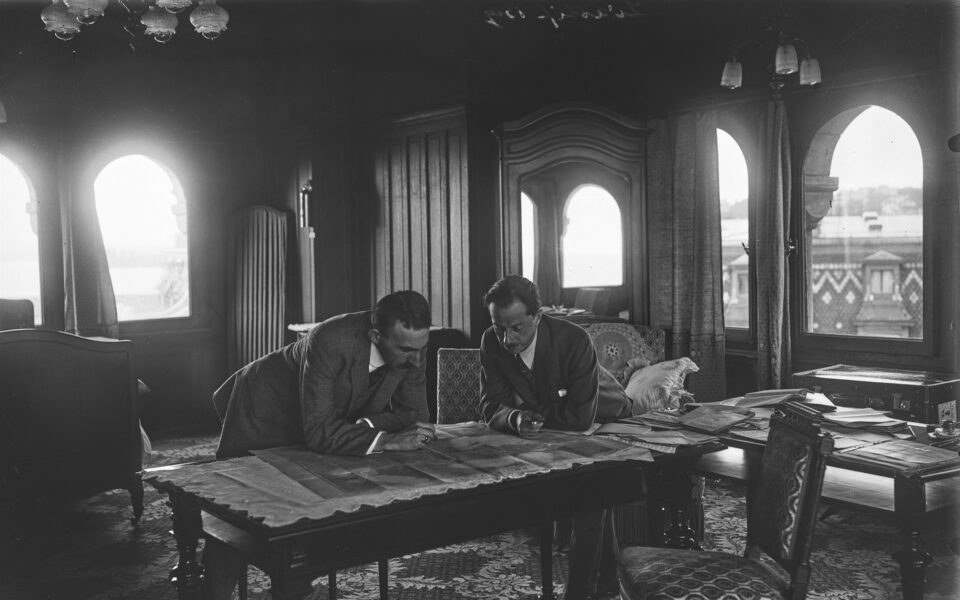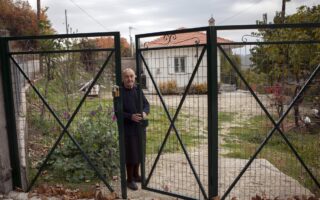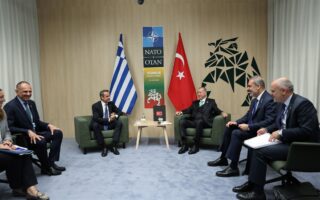The Lausanne Treaty and the Middle East

This year marked the centennial of the Lausanne Treaty, one of the most consequential diplomatic agreements in history. During WWI the Allies promised to hold Turkish leaders personally accountable for their genocide of Christians. But the 1923 Lausanne Treaty between the Allies and Turkey did the opposite, rewarding Turkey with more territory and legitimizing and facilitating Turkey’s ethnic cleansing of surviving Christians. Not surprisingly, this encouraged more genocide and ethnic cleansing in WWII.
The Lausanne Treaty came about because Turkish nationalists, led by Mustafa Kemal, refused to honor the original peace terms their government signed. They continued fighting, expelled Allied occupation forces, and finished eliminating Christians who had lived in Asia Minor for millennia. Germans living under the harsh Allied reparations took note. When Hitler came to power, he emulated the Turks. He disarmed the Jewish population, stigmatized them as dangerous outsiders, confiscated their property, moved them away from population centers to better hide their fate, and then mass-murdered them. Other ethnic minorities were also forcibly deported during and after WWII in attempts to create religious and ethnically homogenous populations.
Lessons from the Lausanne Treaty remain relevant. Without knowledge of past events, it is impossible to understand why they took place or how to prevent a repeat of similar horrors in the future. The current violence in the Middle East is a case in point. Many features of the conflict between Israel and Hamas replicate the conflict that led to Lausanne. Hamas’ goals, strategy, propaganda, and religious bigotry are eerily like those of Kemal’s nationalists.
Goals: Apologists for Turkey said they were fighting a “war of independence” and called Kemal the Turkish “George Washington.” The truth is that Turkish independence was never at stake. The treaty preceding the Lausanne Treaty also guaranteed Turkish sovereignty over the bulk of Asia Minor. Yet the nationalists wanted more territory and all their Christians dead or evicted. They promised supporters they would “establish the borders [of Turkey] according to the degree of our power and our strength,” and they continued eliminating Turkey’s Christian minorities even as they negotiated their new treaty in Lausanne. And Kemal was no George Washington. He wanted power and refused to share it. Within two years of signing the Lausanne Treaty he had secured one-man rule and he never relinquished it.
Similarly, Hamas is not fighting for Palestinian freedom. The residents of Gaza voted Hamas into power 17 years ago and Hamas never allowed another election. Muslims in Israel have more liberty than those living under Hamas. Anyone “yearning to breathe free” would be better off in Israel, the region’s only democracy in a vast sea of surrounding countries controlled by Muslim governments that do not have religious freedom or guaranteed civil liberties. In short, Hamas fights for the same thing Turks did: territory and the elimination of all non-Muslims in it.
Strategy: Hamas cannot now defeat Israel militarily, but it hopes to achieve victory by isolating Israel. They want other nations to restrain Israel and force it to negotiate. Similarly, a hundred years ago, Kemal’s Turkish nationalists were no match for the Allies militarily, but they managed to secure victory by isolating their major military adversary: Greece.
All the Allied forces in Asia Minor clashed with Kemal’s nationalists: the Greeks at Smyrna (5/1919); the French at Marash (2/1920); the British at Ismid (6/1920); and the newly formed Armenian Republic (9/1920). But most Allied forces were Greek because American, British, and French troops were occupying Germany. Allied leaders asked Greece to send troops to Asia Minor. The Greeks were happy to do it, wanting to protect Greeks terrorized by the Turks before and during the war but also hoping to secure territory around Smyrna (current Izmir), which at the time was home to three times as many Greeks as Athens.
From 1919-1920, the Greeks defeated nationalist forces in Thrace, Ionia, and near Constantinople. To reverse his fortunes, Kemal had to divide the Allied forces. Sowing discord among Western nations had been a staple of Turkish diplomacy for centuries, and it worked again. The Italians, believing they had not been properly compensated for their war effort, betrayed their former partners, and helped Kemal. France, jealous of British influence and suffering from Turkish massacres of French forces, also switched sides. Russia, newly controlled by Bolsheviks and happy to hurt the Western powers, also gave Kemal support. Then Britain turned its back on Greece, believing it needed France and Italy as allies more than the Hellenes (a supposition proved wrong during WWII)! Finally, the United States did the same, leaving Greece totally isolated.
Even so, Greek forces alone came within a hair’s breadth of defeating the nationalists. In the climactic three-day see-saw battle of Sakarya in 1921, Greek forces fought uphill against entrenched Turkish positions until they ran out of ammunition and had to fall back. With the Greek treasury empty and no Allied loans forthcoming, Turkish forces had success from that point on. If the Allies had helped supply Greece, or even just refrained from helping Kemal, it likely would have gone the other way. The same is true of Israel’s current conflict. Western nations hurt Israel by relaxing sanctions on Iran, allowing it to finance Hamas’ terror, and now they are pressuring Israel to cease military operations. Like small Greece, tiny Israel must retain at least the passive support of its allies. Otherwise, it will not prevail in what is sure to be an ongoing struggle.
Hamas cannot now defeat Israel militarily, but it hopes to achieve victory by isolating Israel. They want other nations to restrain Israel and force it to negotiate
Propaganda: Outlandish propaganda set the stage for the Turkish diplomacy that forced the withdrawal of Greek forces. Kemal accused the Allies of conducting genocide against Muslims but the truth was the exact opposite. By the time the Lausanne Treaty was signed on July 24, 1923, the Turks had mass-murdered between 1.5 and 2.5 million Christians and forced an even larger number to flee for their lives. Similarly, Hamas’ propaganda turns reality on its head, accusing Israel of the genocide Hamas is perpetrating. Hamas brags about and even films its murder, rape, beheading, mutilation, and burning alive of innocent Israeli civilians, including babies. Then it uses civilians as shields during Israel self-defense operations to generate casualties among its own populace.
The Turkish nationalists and Hamas also misrepresent their intentions. Kemal’s propagandists told the world their slogan, “Turkey for the Turks,” meant they wanted liberty and to be free of foreign domination. Apologists for Hamas also claim its slogan is a call for liberty: “From the River to the Sea Palestine Will be Free.” But as Hamas leaders admit, it means the same thing Kemal’s slogan meant: the complete elimination of any non-Muslim state and its populace from the territory they covet. They promise to keep attacking until Israel and Israelis are no more. Despite manifestly false depictions of motives and methods, Hamas has fooled many, just as the Turks did a century ago.
Religious bigotry: The other similarity that cannot be overlooked is the sheer sadism of the Turkish nationalists and Hamas. The Turks murdered, raped, and terrorized their victims with unspeakable cruelty, and Kemal also encouraged the atrocities, making sure “the most murderous Turks received the greatest rewards”:
“Many of the murdered Christians were killed with knives, bayonets, axes, and stones; thousands were burned alive…; tens of thousands of women and girls were gang-raped and murdered; clerics were crucified; and thousands of Christian dignitaries were tortured – eyes gouged out, noses and ears cut off, feet turned to mush – before being executed.”
“Turkish Muslim clerics and seminarians were prominent among the killers and jihadist rhetoric was prevalent, if not dominant, in sermons, billboards, and the Turkish press” (all quotes are from the most authoritative history of the Asia Minor catastrophe: “The Thirty Year Genocide: Turkey’s Destruction of Its Christian Minorities, 1894-1924”).
Western leaders fret about “Islamophobia,” but it is Christians in Africa, the Middle East, and other Muslim countries that are often persecuted, burned, and hacked to death, not the reverse. No one wants to blame an entire religion, but the more history one knows, the harder it is to avoid the conclusion that Islam plays a role in the savagery of Hamas, as it did for the Turks. Perhaps the belief that non-Muslims are inherently of lesser status and worth is the first step in dehumanizing atrocity victims.
Aeschylus observed that “in war, the first casualty is truth.” Perhaps the converse is true, and the first step toward peace is embracing truth. In the case of the Middle East, the truth about the Lausanne Treaty is a good place to start. The Western Allies should not have abandoned their democratic ally, Greece, in favor of the authoritarian Kemal. Neither should they abandon democratic Israel as it fights for survival. If we want a world without genocide, we need to stop rewarding it and start punishing those who perpetrate it. Letting the Israelis defend themselves does that. The slogan to embrace is not “From the River to the Sea,” but “Never Again”; meaning no more rewarding of genocide or participating in the duplicitous diplomatic maneuvers that help enable it.
Ismini Lamb is the director of the Modern Greek Studies Program at Georgetown University and the co-author of George Horton’s biography “The Gentle American: George Horton’s Odyssey and His True Account of the Smyrna Catastrophe” (Gorgias Press).





